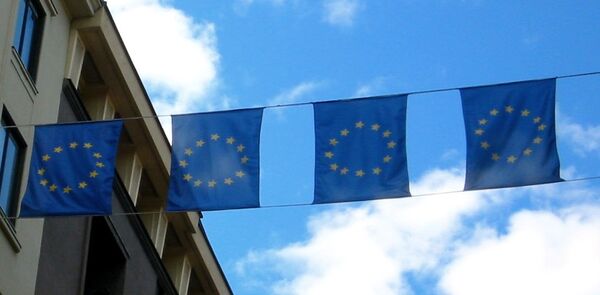Moscow. (RIA Novosti political correspondent Andrei Fedyashin) – Starting today, December 1, Greater Europe will live under a new Constitution. It took eight years to adopt and nobody dares use the term “constitution” officially because it was so difficult to adopt it. They prefer to call it the “Lisbon Treaty on reform.”
The Lisbon Treaty, which has changed the decision-making process inside the European Union (EU), granting more authority to a Euro Parliament, has ardent supporters and no less ardent opponents. The former believe that it promotes the process of European integration whose voice will be heard from Beijing to Washington. The latter think the treaty does not resolve what its critics call a “shortage of democracy” in the EU.
The introduction of the new charter will make life easier for the bureaucrats in Brussels. They started working on it in 2001 and in the process made drastic changes to the charter documents on the structure of the EU and its institutions, and on EU membership. Ireland twice held a referendum on the treaty. Last year it rejected the treaty but this year it approved it by an impressive majority on October 2.
To understand the reasons behind the new standards and rules of conduct in the EU, we must recall that the need for reform became urgent in 2004. Since then and through 2007, the number of EU members increased from 15 to 27. The biggest wave of EU expansion included Hungary, Cyprus, Latvia, Lithuania, Malta, Poland, Slovakia, Slovenia, the Czech Republic and Estonia, that is, almost the entire communist bloc. Two former people’s democracies -- Bulgaria and Romania -- also joined the EU in 2007.
The new members were eager to partake of European prosperity. They brought a lot of manpower but failed to understand the Western way of life in the EU, and displayed too much arrogance using the opportunity to vote and block any decision inside the EU. The new members received much more from Europe than they gave it, excluding actual territory. They had a strange interpretation of the correlation of their rights and duties. They demanded a political voice, which did not correspond in any way to their economic, financial, demographic or territorial weight, not to mention their service record.
Brussels makes all major decisions on the basis of consensus and the EU veterans, primarily France, Germany, Italy and Spain felt that they were no longer perceived as such. The fact that countries with as little as four or even two million people can block any decision in a community with more than 500 million people began to appear absurd. This flaw of European democracy had to be corrected.
Today, the new EU officials assume office: former Belgian prime minister Herman Van Rompuy, was chosen EU president and Catherine Ashton of Britain the EU High Commissioner for Foreign Affairs and Security Policy (foreign minister). The latter said instantly that she will conduct “quiet diplomacy.” Well, neither Paris, Berlin nor London (where the Tories are bound to come to power next year) will let her conduct a “loud diplomacy” (Lady Ashton is a staunch Labour supporter).
The new EU leaders are not likely to change much in Russia’s relations with the EU. Our problems with the EU can only be resolved on the national level, through talks with any of the 27 member states. Neither Mr Rompuy, nor Baroness Ashton can do much in this respect. Mr Rompuy’s first responsibility is to balance the complicated relationships within the EU.
The opinions expressed in this article are the author's and do not necessarily represent those of RIA Novosti.
Europe quietly accepted Lisbon Treaty

© Flickr / futureatlas.com
Subscribe
Moscow. (RIA Novosti political correspondent Andrei Fedyashin) – Starting today, December 1, Greater Europe will live under a new Constitution. It took eight years to adopt and nobody dares use the term “constitution” officially because it was so difficult to adopt it. They prefer to call it the “Lisbon Treaty on reform.”
